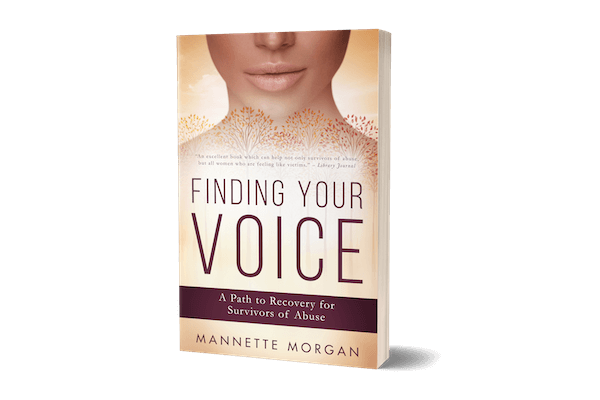By Mannette Morgan, Author of Finding Your Voice: A Path to Recovery for Survivors of Abuse
As a little girl, I knew I wanted to be a writer “when I grew up.” The problem was, I couldn’t read or write. I realized at a young age that I didn’t learn like everyone else. I felt stupid, different, and disconnected from others. I struggled to read, write, and spell for the entirety of my childhood.
I was in seventh grade when my mother had my brother and I tested for a learning disability. At age 12, we discovered we both had dyslexia. I could barely read on a third-grade level, and I couldn’t even spell on a first-grade level. Along with the news that my brother and I had dyslexia, they also told her it was highly likely that neither of us would graduate high school. Looking back, it was a blessing that my mother never told us.
Not only did I have to learn how to navigate the world with a learning disability, but I also survived physical, sexual and emotional abuse. My father was fervently abusive and full of rage for as long as I can remember. At age 8, my older cousin sexually abused me until I was almost 13. At 16, I dated a handsome, charismatic boy from high school who was emotionally abusive and eventually married him. All of these challenges further diminished my self-worth and self-confidence.
As an adult, years after I had overcome many obstacles, I started focusing on how I had overcome all of my trauma, especially the abuse. My desire was to help others overcome and heal from their challenging experiences. That is when I started writing Finding Your Voice: A Path to Recovery for Survivors of Abuse. As I formulated the book, it was a journey of self-discovery as well, as I began to realize the tools I had used to overcome adversity as a young woman.
The desire to overcome my disability and abuse was directly correlated to my mother’s patience, support, and unconditional acceptance. She was a vital part of my survival (and eventual thriving) as an individual. She always said, “Mannette, you are just different. You’re not stupid. Everyone in this world has something to offer; you will just have to discover what it is you have to offer.”
Her support and encouragement were the biggest reasons I graduated high school and never gave up. Every child (and adult) who has faced adversity needs someone in their corner, whether it is a parent, grandparent, teacher, or mentor who accepts and supports them. We all need hope for the future and a feeling of purpose to move past our challenges and grow.
Another key to overcoming adversity is changing our perspective. Self-worth is not only the first self-belief we lose, but it is also the hardest to regain. Knowing your worth is vital for every individual and is what I believe to be the foundation of our self-confidence, self-acceptance, and self-respect. These were the self-beliefs I lost as a victim and growing up with a disability. In order to move forward, I had to let go of a belief that I was stupid, as well as one of being a victim. Instead, I changed my perspective and became a person that believed I was capable of learning. I learned to leave behind the label of victim and believe I was so much more: I was a survivor. I learned to believe in myself and my abilities, and, over time, I regained my self-worth and discovered my value as an individual. The shift in my perspective lead me in a more hopeful and positive direction as I regained my self-worth.
As I matured, I found happiness and contentment in my roles as mom, daughter, sister, wife, small business owner, and, most of all, an individual. I accepted that my life would always be full of ups and downs — along with the occasional abrupt stop. But I had acquired confidence along with a strong self-worth, which allowed me to keep pushing through any challenges life threw my way.
My advice to others with disabilities and those who have survived abuse is to take back your self-worth and continually take action to work through your challenges. Don’t just wait around for your life to change — you have to take the steps! Let go of limiting self-beliefs and replace them with truth. If you’re a parent of a child with a disability or survivor of abuse, learn to be patient, supportive, and accepting as you lead your child toward self-reliance and independence. Empower them to be all that they can be, and never limit them or their dreams. They just might write a book one day!
Learn more about the book Finding Your Voice: A Path to Recovery for Survivors of Abuse on Amazon
Mannette Morgan is an inspirational speaker, author, and abuse survivor who is on a mission to stop the cycle of abuse in our society. After 30 years of intense self-work, she overcame her past trauma of emotional, sexual and physical abuse along with powering through the limitations of her learning disability, dyslexia. A life coach certified through the Academy of Solution Focus Training and the American University of NLP, she has emerged as a leading voice among abuse survivors and today inspires others to rise above adversity and strive for a better life. Her incredible story of survival and recovery is documented in the book “Finding Your Voice.” For more information visit: https://mannettemorgan.com


